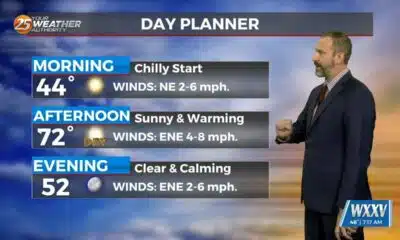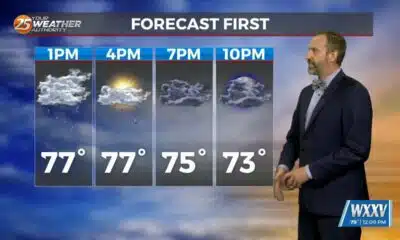Mississippi News
What’s causing the state’s slow shift to renewable energy?
The market, not climate concerns, is driving Mississippi’s slow push for renewable energy
Mississippi, a state where natural gas dominates the energy supply, may soon be turning a corner in its transition to clean and renewable energy. But amid a global effort to reduce the future impacts of climate change, the state is letting the market, not emissions, dictate that shift.
The U.S. as a whole generates about 20% of its power from renewables, which includes wind, hydropower, solar and biomass, such as wood or plants. Renewable energy sources replenish themselves more quickly than traditional energy sources like oil, gas and coal, and significantly reduce emissions that are harmful to the environment.
But in Mississippi, renewable energy generates little, if any, political excitement: A little over 2% of the net electricity utilities generate comes from renewable sources, according to the latest federal data from 2021. State lawmakers have largely ignored the climate debate, even while other state legislatures tackle the issue directly.
But all that is slowly changing in this deeply conservative state. Last November, the state’s largest utility company — Entergy Mississippi — committed to source almost a third of its power from renewables by 2027.
Entergy and other power companies are embracing such a drastic shift largely because producing renewables, especially solar energy, costs a small fraction of what it did just a decade ago. Since 2009, solar power costs have dropped about 90%, and are now cheaper than natural gas, coal and nuclear energy production.
The state’s Public Service Commission has approved several new solar projects since 2020, which combined would more than double the state’s solar capacity. The PSC is also developing programs to give renters and homeowners the ability to generate and sell their own solar power — it’s currently taking comments on an expanded net metering rule until Feb. 8, and is also starting the process to create a new community solar program.
!function(){“use strict”;window.addEventListener(“message”,(function(e){if(void 0!==e.data[“datawrapper-height”]){var t=document.querySelectorAll(“iframe”);for(var a in e.data[“datawrapper-height”])for(var r=0;r<t.length;r++){if(t[r].contentWindow===e.source)t[r].style.height=e.data["datawrapper-height"][a]+"px"}}}))}();
Simon Mahan, executive director of the Southern Renewable Energy Association, said he’s encouraged by the PSC’s recent work around renewables, which includes requiring utilities to submit annual forecasts of their future energy needs, also called Integrated Resource Plans. Mahan believes that Mississippi could soon set itself apart from other Southeastern states in its transition.
“Had you and I had this conversation a year ago, things would be really different,” he said. “But now we’re starting to see things really take off in the state, in part again because we’ve got good commissioners in Mississippi, we’ve just gone through a good process, and utilities are starting to really value renewables.
“Mississippi isn’t a (renewable energy) leader just yet, but it’s on its way.”
But clean energy advocates argue that the market-based approach is not enough, and that emissions need to play a bigger role in the state’s energy decision-making.
Jennifer Crosslin, a regional organizer for the Gulf Coast Center for Law & Policy, explained that data from the Intergovernmental Panel on Climate Change (IPCC) shows the need to drastically reduce greenhouse gas emissions by 2030 to avoid the worst effects of global warming. In the U.S., a quarter of those emissions come from the energy sector.
“We are way behind nationally, and then we look within the nation, we’re even further behind as a state,” Crosslin said.
She pointed to the way investor-owned utilities, including Entergy and Mississippi Power are structured, where their profit comes from what they spend on new projects, and lacks incentives to lower emissions.
“The way that (investor-owned utilities) are currently structured is not moving the needle fast enough,” she said. “That market-based approach is not working at all. It’s time for the state to step in.”
Looking at rising sea-levels and more powerful storms, studies project that Mississippi, along with the other Gulf states, will be one of the hardest-hit parts of the country when it comes to climate change.
Northern District Public Service Commissioner Brandon Presley, the longest-serving of the three elected PSC leaders, explained that the economy, not environmental impacts, will always steer the conversation in Mississippi.
“You have a better chance of getting these projects done because of the economic development side of it than trying to argue the merits of emissions,” Presley said.

Last month, Presley approved a new solar facility in Union County, which will power a Toyota manufacturing plant in Blue Springs.
Central District Public Service Commissioner Brent Bailey, a Republican, echoed his Democrat colleague’s sentiment.
“You do get the environmental aspect as well,” Bailey said, “but being in Mississippi, you know that’s not the primary driver for a lot of this, in my view. It’s always going to get back to the economic benefits first.”
Most states, as well as the District of Columbia, have what’s called a renewable portfolio standard (RPS), which requires that a certain share of its power generated comes from renewable sources by a certain date. Thirty states have an RPS, and another eight have a non-enforceable version of it. Mississippi is one of twelve states, including all of its neighbors and most of the South, with neither.
Presley contended that trying to pass an RPS in Mississippi is, politically speaking, a pointless effort. In most cases, RPS’ are adopted through the state Legislature.
“It wasn’t politically, practically, going to happen,” he said. “If it wasn’t going to get done, why would we waste time chasing rabbits we’re not going to catch?”
Presley added that the state was at a disadvantage in terms of being an early renewable adopter; creating new facilities often means costs get passed down to customers, which in Mississippi means spreading those costs among fewer and poorer ratepayers than in most states.
Mahan, who works with renewable developers across the Southeast, said RPS’ in other states are in part why renewable costs are so much lower now. Such a policy forces utilities to consider environmental benefits, and not just cost, he added; as it stands in Mississippi, no part of the state’s future resource planning requires power companies to weigh the emissions of different sources.
But he also said Mississippi is moving in the right direction regardless. Georgia, for instance, is seeing a surge in renewable capacity despite no legislated mandates.
“The renewable industry has shown up in the state because we believe it’s going to be a good state to do business in,” he said. “Could it have been faster with an RPS? Maybe. But again, the economics of the projects alone is what’s driving the interest in the state and the growth in Mississippi.”
Commissioner Bailey, who’s spent time visiting different schools in his district that have added rooftop solar panels, admitted that he hasn’t had much discussion with state lawmakers about creating new renewable incentives. Rather, he feels confident about the market-driven approach, and is excited about the economic spark renewables could bring to Mississippi.
“We’re excited about the opportunity, we’re excited about the investments at the local level, the revenues that can be obtained from that, and hopefully leveraging and attracting new industry to the state,” he said. “You want your state, your community, your area to be seen as innovative, and I think these are some measures that allow that.”
This article first appeared on Mississippi Today and is republished here under a Creative Commons license.
Mississippi News
Suspect in Charlie Kirk killing is charged with murder as prosecutor says DNA found on rifle trigger
SUMMARY: Tyler Robinson, 22, was charged with the murder of conservative figure Charlie Kirk, shot Sept. 10 at Utah Valley University. Robinson confessed via text to his partner and left a note expressing intent to kill Kirk, citing hatred. DNA linked Robinson to the rifle used. Prosecutors revealed Robinson planned the attack for over a week and targeted Kirk, a key conservative youth leader. Robinson’s political views shifted after dating a transgender man, causing family tensions. After the shooting, Robinson discarded evidence and urged his partner to delete texts. FBI investigates possible wider connections. Charges include murder with potential death penalty enhancements.
Read the full article
The post Suspect in Charlie Kirk killing is charged with murder as prosecutor says DNA found on rifle trigger appeared first on www.wjtv.com
Mississippi News
Suspect in Charlie Kirk assassination believed to have acted alone, says Utah governor
SUMMARY: Tyler Robinson, 22, was arrested for the targeted assassination of conservative activist Charlie Kirk in Orem, Utah. Authorities said Robinson had expressed opposition to Kirk’s views and indicated responsibility after the shooting. The attack occurred during a Turning Point USA event at Utah Valley University, where Kirk was shot once from a rooftop and later died in hospital. Engravings on bullets and chat messages helped link Robinson to the crime, which was captured on grim video. The killing sparked bipartisan condemnation amid rising political violence. President Trump announced Robinson’s arrest and plans to award Kirk the Presidential Medal of Freedom.
The post Suspect in Charlie Kirk assassination believed to have acted alone, says Utah governor appeared first on www.wjtv.com
Mississippi News
Americans mark the 24th anniversary of the 9/11 attacks with emotional ceremonies
SUMMARY: On the 24th anniversary of the 9/11 attacks, solemn ceremonies were held in New York, at the Pentagon, and in Shanksville to honor nearly 3,000 victims. Families shared personal remembrances, emphasizing ongoing grief and the importance of remembrance. Vice President JD Vance postponed his attendance to visit a recently assassinated activist’s family, adding tension to the day. President Trump spoke at the Pentagon, pledging never to forget and awarding the Presidential Medal of Freedom posthumously. The attacks’ global impact reshaped U.S. policy, leading to wars and extensive health care costs for victims. Efforts continue to finalize legal proceedings against the alleged plot mastermind.
The post Americans mark the 24th anniversary of the 9/11 attacks with emotional ceremonies appeared first on www.wcbi.com
-
News from the South - North Carolina News Feed6 days ago
What we know about Charlie Kirk shooting suspect, how he was caught
-
Local News7 days ago
Russian drone incursion in Poland prompts NATO leaders to take stock of bigger threats
-
Local News Video7 days ago
Introducing our WXXV Student Athlete of the Week, St. Patrick’s Parker Talley!
-
News from the South - North Carolina News Feed6 days ago
Federal hate crime charge sought in Charlotte stabbing | North Carolina
-
The Center Square7 days ago
Weapon recovered as manhunt continues in Kirk assassination investigation | National
-
News from the South - Alabama News Feed7 days ago
News 5 NOW at 8:00am | September 11, 2025
-
News from the South - Arkansas News Feed5 days ago
NW Arkansas Championship expected to bring money to Rogers
-
Our Mississippi Home4 days ago
Screech Owls – Small but Cute



















































